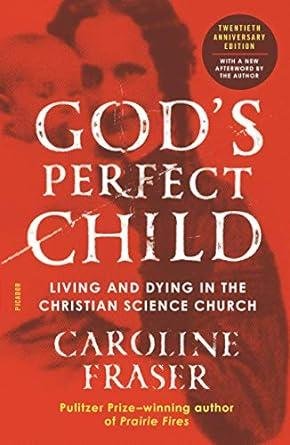God's Perfect Child: Living and Dying in the Christian Science Church by Caroline Fraser
Introduction
Caroline Fraser’s "God's Perfect Child: Living and Dying in the Christian Science Church" is an illuminating exploration of the Christian Science movement, its origins, and its profound effects on its followers. This article delves into the key themes and narratives presented in Fraser's book, examining the church's history, doctrines, and the personal stories that underscore its controversial stance on health and healing.
Origins and History of Christian Science
Christian Science was founded in the late 19th century by Mary Baker Eddy, who claimed to have discovered the principles of spiritual healing after experiencing a miraculous recovery from a severe injury. Eddy's teachings, compiled in her book "Science and Health with Key to the Scriptures," became the cornerstone of the Christian Science faith. She emphasized that true healing comes from understanding one's spiritual perfection and denying the material reality of illness.
Fraser provides a comprehensive historical account of Eddy's life, her struggles, and the establishment of the Church of Christ, Scientist. Eddy's charismatic leadership and the promise of spiritual healing attracted a significant following, but her methods and claims also sparked controversy and criticism.
Core Beliefs and Practices
At the heart of Christian Science is the belief that the material world, including illness and disease, is an illusion. Adherents are taught that they can overcome physical ailments through prayer and a deep understanding of their divine nature. This doctrine often leads followers to reject conventional medical treatments in favor of spiritual healing.
Fraser meticulously examines these core beliefs, highlighting the tension between faith and reason. She explores the experiences of individuals who have turned to Christian Science for healing, often with varying degrees of success. The book raises important questions about the ethics and consequences of eschewing medical intervention.
Impact on Followers
One of the most compelling aspects of "God's Perfect Child" is Fraser's focus on the personal stories of Christian Science practitioners. These narratives illustrate the profound impact of the church's teachings on the lives of its members. Some followers report miraculous recoveries and a deep sense of spiritual fulfillment, while others face tragic consequences due to their refusal to seek medical care.
Fraser tells the story of children who have died from preventable illnesses because their parents adhered strictly to Christian Science doctrines. These heartbreaking accounts underscore the potential dangers of prioritizing faith healing over medical treatment. The book also examines the legal battles and public outcry that have arisen in response to such cases, highlighting the complex interplay between religious freedom and public health.
Living and Dying in Christian Science
Fraser's book does not shy away from the darker aspects of Christian Science. She explores the psychological and emotional toll that the church's teachings can take on its members. The pressure to maintain a facade of spiritual perfection and the fear of being ostracized for seeking medical help can lead to feelings of guilt, shame, and isolation.
The author also addresses the church's handling of dissent and criticism. Former members who have spoken out against Christian Science often face ostracism and backlash from the community. Fraser’s thorough investigation sheds light on the challenges faced by those who choose to leave the faith, as well as the support networks that have emerged to help them transition.
The Broader Cultural Impact
"God's Perfect Child" goes beyond the individual experiences of Christian Science adherents to examine the broader cultural and societal impact of the movement. Fraser discusses the church's influence on American religious thought and its role in the larger context of alternative medicine and holistic health practices.
The book also considers the media's portrayal of Christian Science, from early 20th-century news reports to more recent documentaries and exposés. Fraser's analysis of the church's public relations efforts reveals a strategic attempt to shape its image and counteract negative publicity.
Caroline Fraser's "God's Perfect Child: Living and Dying in the Christian Science Church" is a meticulously researched and deeply human exploration of a controversial religious movement. Through historical analysis, personal narratives, and cultural critique, Fraser provides a nuanced and comprehensive portrait of Christian Science. Her book challenges readers to consider the complex interplay between faith, health, and individual autonomy.
For those seeking to understand the profound impact of Christian Science on its followers and society at large, Fraser's work is an invaluable resource. Now available in EPUB format, "God's Perfect Child" offers an accessible and engaging read for anyone interested in the intersection of religion and health.
